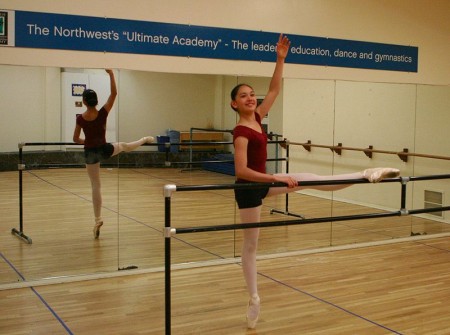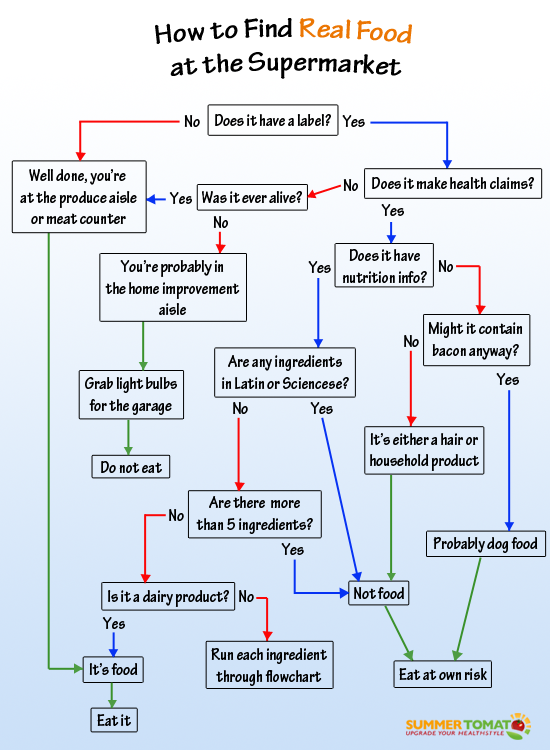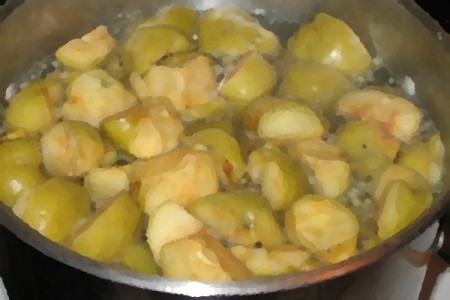Darya Pino from Summer Tomato has a cute little flow chart to help you identify “Real Food” in the supermarket. It takes the conservative approach to eating shared by Michael Pollan, who recommends only eating thing your grandmother would have recognized as food, and Food Politics‘ Marion Nestle’s interdiction against foods with more than five ingredients.
Category: Health
Sex. Ed. on TV update
The National Campaign to Prevent Teen and Unplanned Pregnancy has recently issued a report showing that teen pregnancy dropped by 6% in 2009. They have some evidence that the TV show “16 and Pregnant”, which I’ve mentioned before, is one of the reasons why.
Among those teens who have watched MTV’s 16 and Pregnant, 82% think the show helps teens better understand the challenges of teen pregnancy and parenthood and how to avoid it.
– Albert (2010)
Of course, it’s essential to note that, “Teens (46%) say parents most influence their decisions about sex.”
The report has many more details.
Sex. Ed. on TV
The message — that babies and parenting are hard work — seems to be sinking in for some of its intended audience. [15 year olds] Leslie, Miguel and Paola all intend to be parents, but, as Miguel says, “not at this age.” – Grigsby Bates, 2010.
NPR’s Morning Edition had a story on “Teen Mom” and “16 and Pregnant”, two TV shows from MTV. These shows apparently offer a very realistic take on what it means to be a teen parent. So much so, the Kaiser Family Foundation is providing free DVD’s of the 16 and Pregnant series (as well as the Think HIV: This Is Me documentary).
I have not seen either of these series, but am interested in finding out if any of my students are familiar with them, if they’re appropriate for early adolescents, and if anyone else has tried them. From the radio program it sounds like they might be a useful supplement to the Baby Think It Over® infant simulators.
On a somewhat tangential note, every time is see the Baby Think It Over dolls, I’m reminded of Elna Baker’s story, Babies Buying Babies (see Act 3), on This American Life. It’s about the choices parents make when choosing the race of a life-like, newborn doll for their kids. The Baby Think It Over dolls are pretty life-like and I’ve heard anecdotes of kids getting strange looks when walking around, not just with a baby, but one that looks like it’s from a different race.
Making pectin
Extracting pectin for making jelly does not seem to be that hard. Sam Thayer has a nice little article on how to get pectin from apples. The blog Spain in Iowa, has some nice pictures and video of how they extracted pectin from apples and what the result should look like when you test it by putting a teaspoon of pectin into a teaspoon of rubbing alcohol. Almost immediately (but leave it in for a minute), the pectin should jell in the rubbing alcohol and you should be able to pull it out using a fork.
Basically, all you do is chop up the apples, cook them for a long time over low heat till they’re broken down, and then strain out the liquid produced. Since I have access to a lot of green apples that won’t be used for anything else, I tried the process myself. Using a pot full of apples I produced a lot of liquid; way more than I could ever use, but the process seems to work fairly well.
One 8 quart pot of apples produced 8.75 cups of liquid. I’d planned to use the home-made pectin in my currant jam, but testing the currant juice showed that it had just as much, if not more pectin than my boiled apple residue. I guess I’ll save the apple pectin for future use.
Ideally, Student Run Businesses should sell goods or services that are worth the value paid. While I appreciate that there is some value to the sympathy of friends and family, it is nice when customers believe they’re getting a good deal even without that. One direction I try to direct the students is toward making things from scratch, because it adds so much to the experience. Then they can have the extra value of using natural, perhaps even organic, ingredients and satisfying Michael Pollan’s rules for good eating.

My students have not yet tried jam or jelly-making, but if they do natural pectin would be great.
Omnivore’s dilemma for kids
The Omnivore’s dilemma has a version for young readers. The full version is a good read, but is a bit long. One of my student read the first chapter and did not get too excited, so maybe this one will be a more captivating read.
Stress, pressure and performance
How well does extrinsic motivation help us perform? NPR recently had another interesting interview with Dan Ariely where he talked about how rewards, cash bonuses in this case, affect performance.
It turns out that while bonuses increase people’s desire to perform better, people actually perform worse, probably because of the increased stress.
Jonah Lehrer actually suggests that this also applies to negative rewards. He suggests the engineers trying to cap the oil leaking beneath the Gulf of Mexico should take more time off because pressure from powerful incentives reduces our ability to think creatively.
So think about what this implies for high-stakes testing.
Fractured thinking – How the internet affects how you think
While many people say multitasking makes them more productive, research shows otherwise. Heavy multitaskers actually have more trouble focusing and shutting out irrelevant information, scientists say, and they experience more stress.
And scientists are discovering that even after the multitasking ends, fractured thinking and lack of focus persist. In other words, this is also your brain off computers. Richtel, 2010
Matt Richtel has an intriguing article in the New York Times on how multitasking on computers is affecting the way people think. I don’t have a whole lot of time to get into it is a well resourced article citing work from researchers such as Clifford Nass, Eyal Ophir and Melina Uncapher at Stanford, Steven Yantis at Johns Hopkins, Daphne Bavelier at the University of Rochester, Gary Small at UCLA and Adam Gazzaley at UCSF.
Other choice quotes:
[Multi-taskers] had trouble filtering out … the irrelevant information.
multitaskers tended to search for new information rather than accept a reward for putting older, more valuable information to work.
that people interrupted by e-mail reported significantly increased stress compared with those left to focus. Stress hormones have been shown to reduce short-term memory
Finally, the article ends with a thought about how technology use affects our ability to relate to others.
Mr. Nass at Stanford thinks the ultimate risk of heavy technology use is that it diminishes empathy by limiting how much people engage with one another, even in the same room.
“The way we become more human is by paying attention to each other,” he said. “It shows how much you care.”
That empathy, Mr. Nass said, is essential to the human condition. “We are at an inflection point,” he said. “A significant fraction of people’s experiences are now fragmented.”
This work of course ties in with Nicholas Carr’s thesis that asks the question, “Is Google Making Us Stupid“. Carr’s book, “The Shallows” takes up the argument that we should spend less time online. While I tend to agree with Carr that we would benefit from more time offline, I really think his explanation that the invention of the press, and cheap books, lead to more deeper concentration (and that’s what we’re loosing now) needs a lot more evidence to back it up.
Reflection versus reflection

We want students to spend some time in introspection, but it is sometimes difficult to focus and understand what we’re trying to accomplish. The other day I ran across a small mirror, about 10 cm in diameter, sitting in the closet. It was our half hour for Personal World so I handed it to a student who was still trying to settle down and said, “Reflect.”
After the obligatory eye-roll, the student went on with their introspection, twirling the mirror around in their hands. A few days later, the student mention the event in their newsletter article, where it came to the attention of one of our parents, who an Educational Psychologist at a near-by liberal-arts college. She mentioned it to one of her colleagues who’s a social psychologist, and it turns out that there’s a lot of research on the psychological effect of looking into mirrors. In fact, mirrors are an important tool for researchers, but much of the research has found that people are most often negatively affected by mirrors.
social psych has studied extensively the impact of mirrors on people—they increase a state called “objective self awareness” where you become aware of yourself as a social object. It is usually associated with negative affect because it causes us to compare ourselves to our internal standards (and we usually fall short of them). We then make attempts to “escape self-awareness” by doing physical distractions (or even abusing drugs) or by repairing our image by doing good deeds or trying to live up to our standards.

Some of the research is fascinating. Mirrors are extensively used in ballet training, yet Radell et al., (2004) found that ballet dancers performed better after classes in rooms without mirrors. Scheier and others (1981) found that mirrors made people more likely to withdraw from fearful situations.
[A] state of heightened self-awareness can be created when an object in one’s environment, like a mirror, focuses an individuals’ attention on one’s self. This state of self-awareness causes the individual to compare one’s self to ideals presented in the environment. In a ballet class, this could be other students’ performances or a teacher’s demonstration. If the student feels she is not matching the ideal characteristics presented to her, then negative self-evaluation may result. – Radell et al., 2004.
There is some suggestion that heightened self-awareness, though not necessarily attained only through the use of mirrors, does have positive effects, but I’ve barely been able to scratch the surface of the literature.



